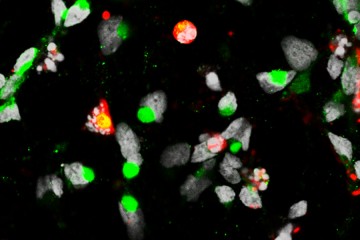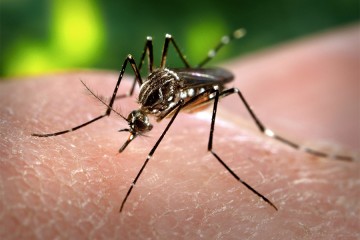Johns Hopkins University will welcome design and outdoors enthusiasts, those with backgrounds in health or engineering, and anyone else interested in developing creative solutions to help stem the Zika virus epidemic for a two-day design challenge next week.
The Emergency Zika Design Challenge—co-hosted by JHU's Center for Bioengineering Innovation and Design and Jhpiego, a global health affiliate of Johns Hopkins—will be held April 9-10 in the BME Design Studio in Clark Hall on the university's Homewood campus.
Participants will focus on how to prevent mosquito bites—because despite significant efforts and technological advancements, mosquitoes continue to pose considerable public health threats to Central and South America. Zika virus, which is primarily spread by the mosquito Aedes aegypti, has been linked to Guillain-Barré syndrome in adults and also to birth defects, including microcephaly.
"The biggest hurdle [to public health] is mosquito control and trying to prevent the mosquitoes from spreading the disease, which can be very difficult," Johns Hopkins epidemiologist Anna Durbin said recently. "I think the biggest thing to try to do right now is to be informed about protecting yourself from mosquitoes."
Common methods of protecting against mosquito bites include the use of topical insect repellents; protective clothing such as insecticide-treated clothing; bed nets and insecticide-treated nets; and screens, mesh, or netting on windows and doors.
Participants in the Emergency Zika Design Challenge can work on a range of solutions, including developing repellents, sprays, and creams to prevent mosquito bites; or creating protective clothing and other gear. Health and/or design expertise is not required, organizers say—the event is open to anyone, from the JHU community and beyond.
"We will convene an enthusiastic crowd of unlike minds, provide the very deepest insights into the problem from experts, and create an environment that is full of fun and conducive to collaboration, a space where people feel perfectly safe to be outliers," says Harshad Sanghvi, Jhpiego's medical director and vice president for innovations.
The Zika challenge was modeled on the successful Emergency Ebola Design Challenge, a 2014 event that led to the creation and eventual production of a protective suit designed to keep health workers comfortable and reduce the risk of coming in contact with the Ebola virus.
"When you bring together creative people from various ages, backgrounds, and skills and point them at a very important problem, they come up with creative, off-the-wall ideas that you would otherwise never see," says Youseph Yazdi, CBID's executive director. "We couple that brainstorming with experts who quickly separate the unsuccessful ideas from those that are likely to have an impact, and the outcome is often some surprising, useful approaches."
A kickoff meeting for the Emergency Zika Design Challenge will take place at 5 p.m. on Thursday at Clark Hall. Presenters will discuss the current epidemic and will go over the challenge rules. The challenge begins at 9 a.m. on Saturday, April 9, and continues until 3 p.m. on Sunday, April 10.
CBID operates within the Johns Hopkins Department of Biomedical Engineering, which is shared by the university's School of Medicine and its Whiting School of Engineering.
Posted in Health
Tagged public health, epidemiology, jhpiego, cbid, zika virus










